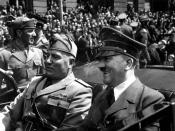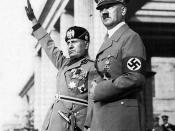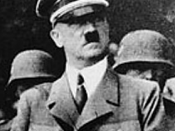Speech
The Transformation of German social and cultural life under Nazism
When an opponent declares, 'I will not come over to your side, 'I calmly say, 'Your child belongs to us already...What are you? You will pass on. Your decendants, however, now stand in the new camp. In a short time they will know nothing but this new community.
Adolf Hitler, a charismatic, Austrian-born demagogue, rose to power in Germany during the 1920s and early 1930s at a time of social, political, and economic upheaval. Failing to take power by force in 1923, he eventually won power by democratic means. Once in power, he eliminated all opposition and launched an ambitious program of world domination and elimination of the Jews, paralleling ideas he advanced in his book, Mein Kampf. His "1,000 Year Reich" barely lasted 12 years and he died a broken and defeated man.
Good- afternoon Mr. Hopper and class.
I decided to focus my area of study on the Transformation of German social and cultural life under Nazism. After assuming political power, Adolph Hitler decided to implement his mission of reviving German strength, acquiring territory for more living space , and establishing a foundation of a pure racial state. In order to achieve his goals, Hitler needed to create a sense of Volksgemeinschaft or a national community unified in mind, will, and spirit.
Volksgemeinschaft could only be attained through total state control; therefore, every facet of cultural and social life had to be controlled to achieve Nazi idealsIn Mein Kampf, Hitler referred to the Enyardtung,'degeneration of German culture."Theatre, art, literature,cimema,press' he wrote " must be cleansed of all manfestations of our rotting world and placed in the service of a moral, poltical and cultural idea". As with many other things that had gone wrong, in Hitler;s opinion...


